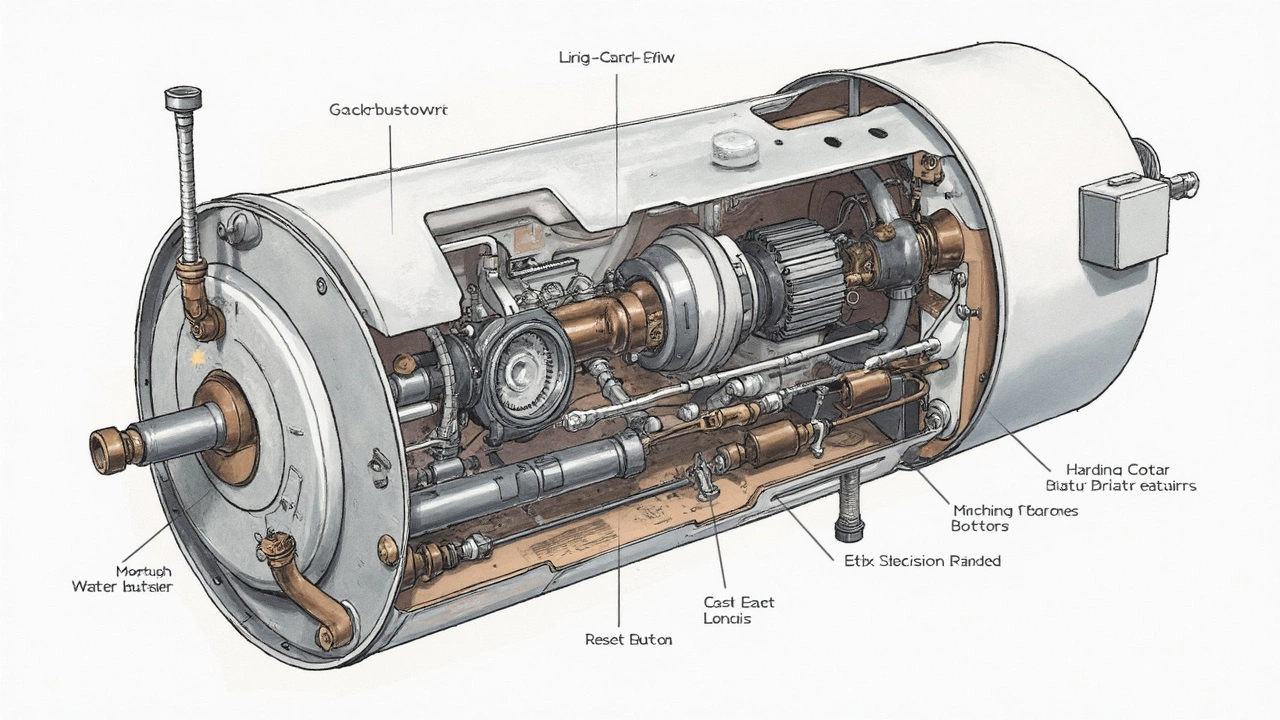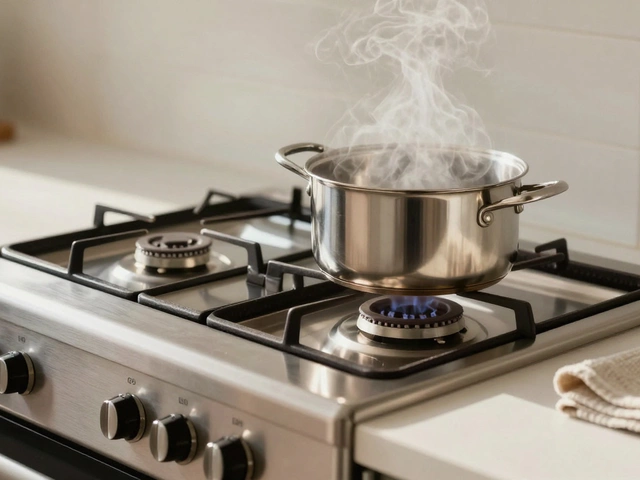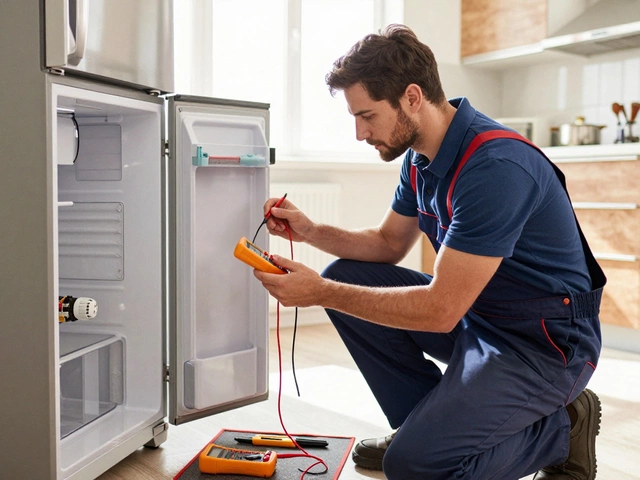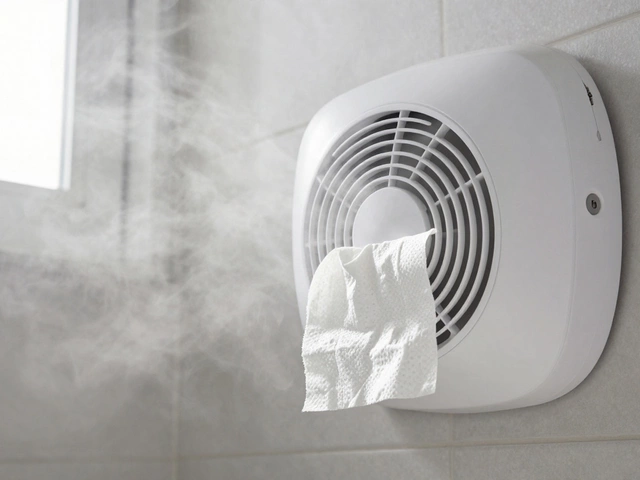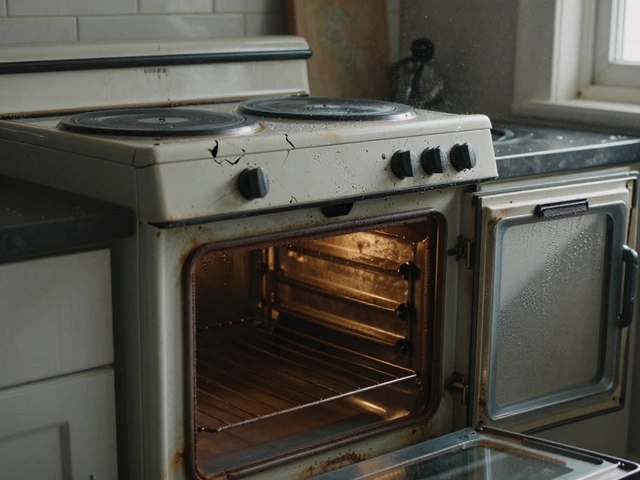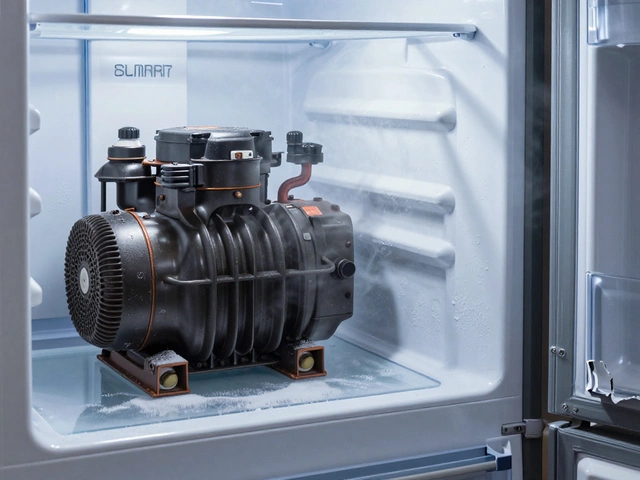So, the water in your shower feels like it's just been scooped out of an ice floe, and you're glaring at the water heater like it's personally betrayed you. Hitting the reset button seems like such a tempting quick fix, doesn't it? But hold up—before you go pressing buttons, let's get into what that little button really does.
The reset button is like a safety feature for your water heater. It's there to stop things before they get sketchy. Typically, it trips and cuts off the power if the water inside gets too hot, which is usually above 180°F. The reason? To prevent the tank from overheating, which could lead to some pretty dangerous situations, not to freak you out or anything.
But why did it trip in the first place? This usually means the thermostat is on the fritz or maybe even a more serious issue like a failed heating element. Before you get all DIY, think about the implications. Pressing reset without knowing what's up might temporarily solve your cold shower blues, but it won't fix the root cause.
- Understanding the Reset Button
- Reasons Your Water Heater Might Need a Reset
- Safety Precautions Before Resetting
- When to Call a Professional
Understanding the Reset Button
Alright, let’s get under the hood of your water heater. The reset button is also called the 'high-limit switch' or, less excitingly, the 'emergency cut off' (ECO) switch. It’s usually a red button that nobody thinks about—until it lights up like a tiny, unmissable alert signal.
Water heater reset buttons are located on the thermostat, behind an access panel. You might need a screwdriver to get in there, so get your tools ready. But before you start, remember: this button isn’t a magic fix-all.
Why do we even have this button? Its main job is safety. If the water temperature inside the tank exceeds 180°F, the reset button trips, cutting off power to the heating elements. This prevents overheating, which could lead to bursts or fires, and we all know that's not the kind of drama we want at home.
Now, you’re probably wondering why your water heater would ever get that hot in the first place. Several things could be at play here, like a faulty thermostat that fails to turn off the heat or a malfunctioning heating element that keeps cranking out the warmth long after it’s needed.
Before you hit that reset, make sure to check what's causing the excess heat. If the problem with the water heater falls outside your comfort zone, calling a pro isn't just an option; it’s the smart move.
- Locate the reset button, usually under a panel.
- Use a screwdriver to open the panel if needed.
- Press the red reset button firmly.
- Reassemble the panel and test your hot water.
Remember, resetting might get your water heater back rocking temporarily, but it’s like putting a band-aid on a bigger issue if it keeps tripping. In these cases, opt for repairs rather than constant resets.
Reasons Your Water Heater Might Need a Reset
You might be scratching your head, trying to figure out why your trusty appliance is suddenly acting up. So, let's break down why that pesky water heater reset might be necessary.
First up, we have the thermostat. This little gadget is the brain of your water heater, telling it how hot to get. If it goes haywire, your water could either stay cold or, worse, get too hot. In this case, the reset button is kind of a temporary Band-Aid.
Another common suspect is the heating element. When this part fails, it throws everything out of whack. The heater struggles to maintain the right temperature and trips the reset button like it's playing a cruel game of red light, green light.
Sometimes, it's all about electrical issues. Loose wiring inside the heater can cause things to short out. Basically, the heater isn't getting the juice it needs to do its job, leading to an unexpected reset.
Let's not forget about sediment buildup. Over time, all that mineral-rich water running through the heater leaves deposits at the tank's bottom. These sediments can insulate the water from the heating elements, causing the system to overheat and cut off.
Check out this table to get a quick snapshot of why your heater might act up:
| Problem | Symptom |
|---|---|
| Thermostat Failure | Water too hot or cold |
| Heating Element Burnout | Inconsistent temperature |
| Wiring Issues | Power cuts off unexpectedly |
| Sediment Buildup | Reduced efficiency |
There you have it—multiple reasons why a water heater reset might be needed. Remember, while hitting that button might get your showers back to bearable, identifying the real culprit is the way to long-term peace of mind.

Safety Precautions Before Resetting
Before you go pushing that water heater reset button, let's make sure you're playing it smart and safe. A few precautions can save you a ton of headaches later. Trust me, it's better than dealing with a flooded basement or worse.
First things first, ensure the power is off. Go to your main circuit breaker and flip the switch for your water heater—just like hitting pause on a chaotic day. This simple step can't be stressed enough, as it helps prevent electrical shocks while you're inspecting or fixing things.
Next up, grab a flashlight and take a close look at your water heater for any obvious signs of trouble. Look for leaks, unusual noises, or wires that look like they are having a bad hair day. If anything seems off, you might want to reconsider resetting until you've figured out what's going on.
If you spot some water pooling around your heater, here’s your cue to call in a pro. A handy reset won't magically fix a leak and can sometimes make it worse.
Check the thermostat settings, too. Sometimes, they're accidentally cranked up too high. Turn them down to a reasonable level, ideally between 120°F and 140°F, which is safely hot without being excessive.
Here's a quick rundown:
- Switch off power at the circuit breaker.
- Inspect for leaks or peculiar noises.
- Verify thermostat settings aren't too high.
- Look for burnt or frayed wires.
If you've done all that and everything looks good, then carefully proceed. But if something still feels off, don't hesitate to call in a professional. Remember, your safety always comes first, and overcommitting to DIY can sometimes lead to more costly problems down the line.
When to Call a Professional
Alright, you're probably thinking, "I can handle this," and maybe you're right. But there are definitely times when calling in a pro is the smarter move. Here’s a breakdown of when you should really consider dialing up a water heater specialist.
Water heater repair isn't something you want to mess with if you notice unusual symptoms that keep popping up. If your unit is constantly tripping the reset button, it could be a sign of electrical issues, faulty wiring, or even a defective thermostat. Electricity and water are not a pair you want to tango with on your own.
Hearing strange noises, like banging or popping? That could be sediment build-up—a little DIY effort might help, sure, but if it's severe, a pro has the tools and know-how to address the problem without stirring up more trouble.
- Leaks: Spotting water pooling around your heater? This isn't something to ignore. Leaks could mean busted pipes, a corroded tank, or malfunctioning valves—all best handled by someone who knows what they're doing.
- Inconsistent Temperatures: If your shower swings from glacier cold to volcano hot without a warning faster than your mood at 7 AM, it's best to have a professional take a look. This might require more than a simple reset.
- Age of the Heater: If your heater is getting up there in years—10 to 15 is the average lifespan—it might be time to think about replacement rather than a quick fix.
And hey, let's not forget those times when you’re just out of your league. Maybe it's a super complex or newer model, or you're kinda unsure about opening it up at all. Experts not only fix things right the first time but ensure you're not spending weekends bailing water or searching "how to install a new water heater."
Safety is key, and if calling a professional saves you from a shocking or flooding fiasco, it’s definitely worth it. Plus, many pros can also help with maintenance advice to keep things running smoothly in the future.
